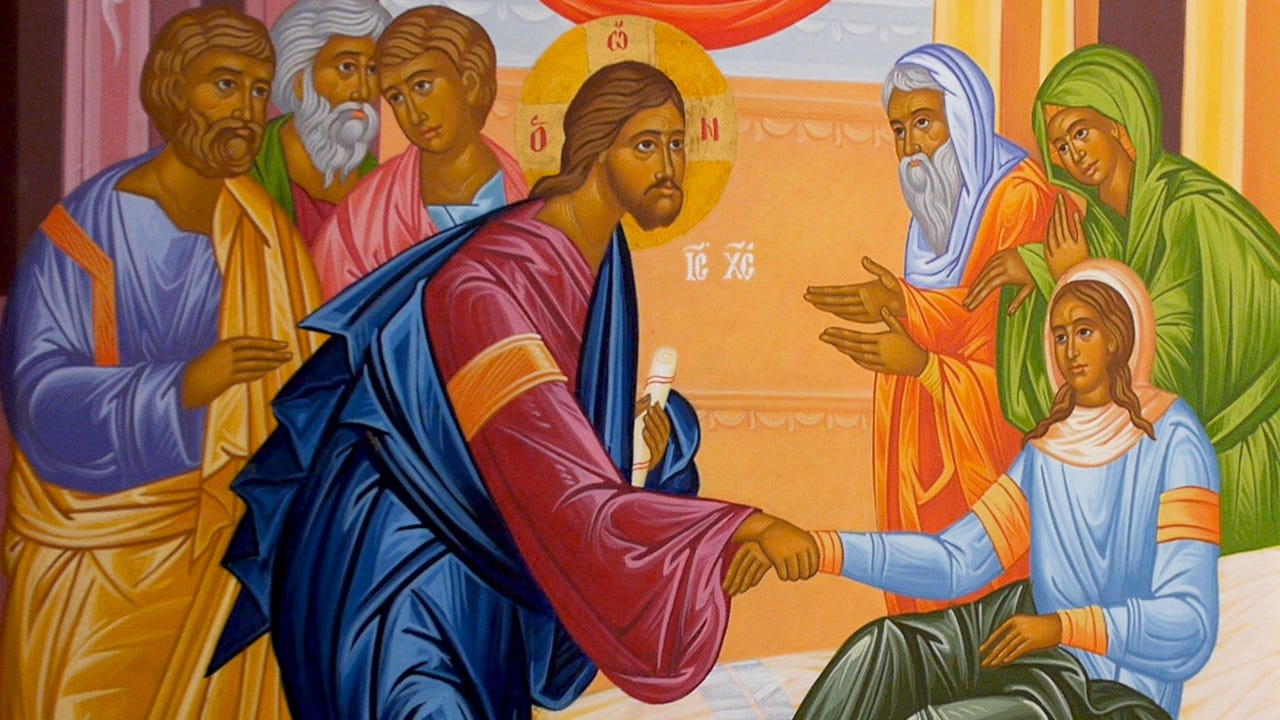In a 2022 podcast, comedian Steven Colbert revealed "deeply intimate" details about loss and grief to host Anderson Cooper. When Colbert was just ten years old, his father died in a plane crash outside Charlotte, NC. "It is a gift to exist, and with existence comes suffering,” said Colbert. “There’s no escaping that,” Colbert continued. “But if you are grateful for your life, then you have to be grateful for all of it.” [i]
In his letter to the Corinthian church, Saint Paul asked, “Death, where is your sting?”[ii]
Rhetorically, we can think to ourselves, “just about everywhere.”
On the front page of today's Post. On the grim face of a doctor informing us of the diagnosis, pointing to a dreaded illness. But also in the faces of those we ignore under a bridge after we Costco or of the one who tells us we are no longer needed by anyone at a job, in a marriage, or in a friendship. We can feel the presence of death when a family member turns their back on us because we support one candidate over another. Or when we turn our back on a family member because they supported a candidate over another.
So, Saint Paul, our rhetorical response to your question is not so rhetorical after all.
Death is the ultimate heartache. Sure, love, hate, and mayhem are everywhere, and all three will break your heart, but death does so with a certain amount of finitude. Last Sunday, I said that throughout The Gospel of Mark, Jesus would be confronted by one crisis after another. Last week, the disciples entered a boat with Jesus, and the crisis of fear and lack of faith confronted Jesus. Then, after healing a man possessed by unclean spirits and returning to the other side of the sea, another crisis is presented to Jesus. This time, the crisis is death.
A leader from the synagogue rushed to Jesus, fell at Jesus’ feet, and begged that Jesus act immediately to care for the man’s daughter. The girl was nearing death. Jesus went with the man. And, as Jesus and the man traveled to the girl, the crowd began to swell and press on Jesus. There was a woman in the crowd who had been bleeding for 12 years. We do not know her specific medical condition, but she would have been considered ritually unclean and might have faced social limitations in her daily living as well.
The woman saw Jesus and, in a moment of desperation, reached out and touched Jesus' clothes. She believed she would be healed if she touched Jesus' clothing, and she was.
To say a lot is going on in this story feels like an understatement. You showed up this morning knowing you would hear a scripture reading, a story about Jesus, but little did you know that you would get what scholars call a Markean Sandwich. The former Archbishop of Canterbury, N.T. Wright put it like this, “the flavor of the outer story adds zest to the inner one; the taste of the inner one is meant to turn to permeate the outer.”[iii]
Where are you in this story? Are you one of the baffled disciples or a member of the crowd who gathered to see what was happening? Perhaps you are the woman whose life has been dominated by illness and the grief of not being able to be with your family or community. Because of her illness, she was all but dead. There is the distraught father who is so desperate to save his little girl that he’d abandon his station and fall at the feet of a backwoods rabbi. The man’s station and pride died as his knees hit the ground.
There are plenty of characters being stung by death. Which are you?
Facing death like the man trying to save his daughter, like the woman seeking healing, or mourning the loss of a relationship or space in your life can leave us in a fog. In these moments, it can feel like we cannot move through the simplest tasks. In his memoir about the death of his son, A Heart that Works, comedian and writer Rob Delaney wrote, “Grief drove a bus through the part of my brain where memories are stored. I forgot the pin to my ATM card. I’d been using it for years, and it just evaporated from my head. I had to get the bank to send me a reminder in the mail.”[iv]
When the simplest of tasks become impossible to do, we can feel like we do not know what we are supposed to do to escape the sting of death.
There is another face in this story—the strong, life-giving face of Christ. Jesus intrudes into situations that appear hopeless and fixed and brings life when the fog of death, grief, desperation, and isolation leaves us not knowing what to do.
Jesus’ call to the healed woman, “Daughter, your faith has made you well; go in peace, and be healed of your disease,”[v] and to the little girl awakened from the grip of death, “Little girl, get up!”[vi] speaks over the laments of the crisis of death. Sitting in the quiet of our homes, in the loneliness of our offices, and in the crisis of the physical death of a loved one, we can feel dead. Deadness can appear to be everywhere. In his memoir about a lifelong career as an undertaker, author, and poet, Thomas Lynch wrote, "Sometimes I stand among the stones and wonder. Sometimes I laugh, sometimes I weep. Sometimes, nothing at all happens. Life goes on. The dead are everywhere."[vii]
We find the Good News of the Gospel in the pervasiveness of death. God, Jesus, does not leave us to ourselves to overcome this separation. “We don’t have to wait for Easter for life to intrude and death to be defeated,”[viii] writes Rev. Will Willimon.
In the face of the crisis of death, Jesus says, “Daughter, your faith has made you well; go in peace,” [ix] and “Little girl, get up!” [x]
Notice that the man, the woman, and even the little girl do nothing except cry out in the face of death. This is a story about what Jesus did and continues to do today.
“Jesus came to raise the dead," says Robert Farrar Capon. “The only qualification for the gift of the Gospel is to be dead. You don’t have to be smart. You don’t have to be good. You don’t have to be wise. You don’t have to be wonderful. You don’t have to be anything… you just have to be dead. That’s it.”
[i] https://www.cnn.com/2022/09/21/entertainment/stephen-colbert-grief-anderson-cooper-podcast-wellness/index.html
[ii] 1 Corinthians 15:55
[iii] Wright, NT. Mark For Everyone. Page 58.
[iv] Delaney, Rob. A Heart that Works. Page 25.
[v] Mark 5:34
[vi] Mark 5:41
[vii] Lynch, Thomas. The Undertaking: Life Studies from the Dismal Trade.
[viii] Willimon, Will. “Get Up.” Preached at Duke University Chapel on June 29, 1997.
[ix] Mark 5:34
[x] Mark 5:41

















